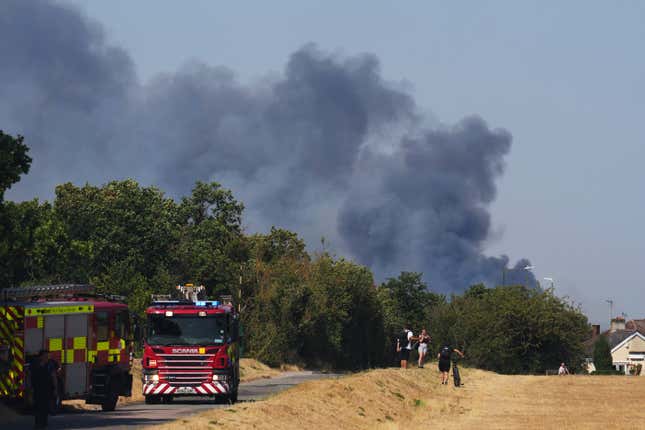
The UK’s meteorological agency confirmed in its annual report about the state of the country’s climate that 2022 was the hottest year on record in all four regions—England, Wales, Scotland, and Northern Ireland. The report released today (July 27) also warned that these temperatures could become more common, and even be considered “cool” by the end of the century.
2022 was the first year to record a UK annual mean temperature above 10°C (50°F), which is 0.9°C above the 1991–2020 average. In what Met Office scientists call a medium emissions scenario, which would come to pass if global temperatures rose by 2.4°C (36.3°F) above pre-industrial levels by the end of the century as a result of greenhouse gas emissions, the temperatures recorded in the UK in 2022 could become the norm by 2060, and be considered comparatively cool by 2100. While the UK is currently being spared the heatwave gripping southern Europe, the country experienced its hottest June on record earlier this year.
The consequences of climate change
These findings might sound alarming, but should not come as a surprise, as these are the known consequences of climate change. A surge in human activities emitting pollution in the atmosphere, such as burning fossil fuels, causes an excess of greenhouse gasses that slow the release of heat into space, warming the planet.
“Studies have shown that both the record warm year and July heatwave were both made much more likely by climate change. The observations show that extremes of temperature are changing faster than the average, and as our climate warms, we expect far more high temperature records to be broken, potentially by wide margins, and far fewer low temperature records,” warned Mike Kendon from the Met Office’s National Climate Information Centre.
It’s not just rising temperatures that are sparking concerns—sea levels are rising, too, and the rate at which they are doing so has increased. “Tide gauge records demonstrate that sea levels around the UK are continuing to rise as water warms and ice sheets melt,” said Dr. Andrew Matthews from the National Oceanography Centre, adding that as sea levels rise, so too, does the danger of a major storm overcoming flooding defenses.
While recent years have been the warmest on record, they have also been among the wettest, highlighting how climate change fuels extreme weather. According to the Met Office, five of the 10 wettest years observed in the UK since 1836 have occurred in the 21st century so far. The concentration of that rainfall is less evenly distributed across the year, with some months being drier than average and others wetter than average.
UK’s state of the climate report, by the digits
40.3°C (104.5°F): Highest temperature ever recorded in the UK, set on July 19, 2022, a day in which more than 800 wildfires were reported across the country
Two: Historical records against which temperatures are compared, one going as far back as 1884 and the other to 1659
18.5 cm (7.2 inches): Increase in sea level since the 1900s, with roughly 11.4 cm (4.5 in) of that rise occurring over the past 30 years (1993-2022)
3%: Increase in hours of bright sunshine in the 2013-2022 decade compared to the 1991–2020 average. That figure rises to 9% when compared to the 1961-1990 period. The 2013-2022 decade is the sunniest 10-year period in the UK series.
Quotable: A warning for the future
Our climate in the UK has a lot of year-to-year variability, but taken overall, 2022 is a potential warning of what we should expect in the future.—Mike Kendon from the Met Office’s National Climate Information Centre, in a statement commenting on the report released on July 27
Political heat about climate change
The UK became the first country in the world to declare a “climate emergency” in 2019, but the government has since shown little urgency to address the crisis. In fact, the political discourse in the UK in recent days has focused on whether the struggling ruling party should withdraw some of its green policies to appeal to electors at the next election, due next year. The Conservative Party has long been trailing the opposition Labour Party in the polls, but last week’s by-elections delivered the party some hope, as it retained one of the three seats up for grabs, the London constituency once represented by former prime minister Boris Johnson.
The Labour Party attributed the narrow loss—the Conservatives won by 495 votes—to the unpopularity of an anti-pollution scheme called Ultra-Low Emission Zone, which charges drivers of vehicles that don’t meet certain emissions standards a daily fee to access certain parts of London. The mayor of London, Sadiq Khan, who recently published a book about climate change titled Breathe: Tackling the Climate Emergency, is now under pressure to revise the scheme’s expansion.
A bipartisan group of lawmakers has urged the government to avoid moving backwards on its climate commitments—which, according to the UK’s independent advisor on tackling climate change, the country is struggling to meet. The lawmakers’ call is strengthened by the results of a survey released this week that shows a majority of UK voters, across party lines, wants to see increased support for renewable energy and other green investments.
Related stories
🥵 The world just recorded its hottest day ever
🔥 The hellacious names of Italy’s heat waves are being chosen for good reason